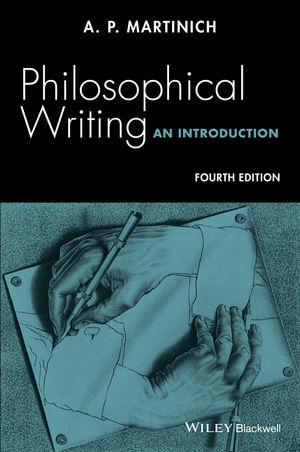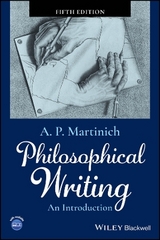
Philosophical Writing
Wiley-Blackwell (Verlag)
978-1-119-01003-6 (ISBN)
- Titel gebraucht verfügbar
- Artikel merken
Philosophical Writing: An Introduction, 4th Edition, features numerous updates and revisions to A. P. Martinich’s best-selling text that instructs beginning philosophy students on how to craft a well-written philosophical essay.
Features an entirely new chapter on how to read a philosophical essay, new sections on quantification and modality, and rhetoric in philosophical writing, as well as more updated essay examples
Includes many new essay examples and an accompanying website with further topics and examples
Traces the evolution of a good philosophical essay from draft stage to completion
Emphasizes what a student should do in crafting an essay, rather than on what not to do
Written with clarity and humor by a leading philosopher
A. P. Martinich is Roy Allison Vaughan Centennial Professor in Philosophy and Professor of History and Government at the University of Texas at Austin. His publications include The Two Gods of Leviathan (1992) and Hobbes: A Biography (1999); and, as co-editor, A Companion to Analytic Philosophy (Blackwell, 2001), Analytic Philosophy, 2nd ed. (Wiley Blackwell, 2012), and The Philosophy of Language, 6th ed. (2013). Martinich is also Vice-President of the Board of Directors of the Journal of the History of Philosophy. Martinich has also contributed to The Philosophers' Magazine and Think.
Note to the Fourth Edition x
Note to the Third Edition xi
Note to the Second Edition xii
Introduction 1
1 Author and Audience 8
1 The Professor as Audience 8
2 The Student as Author 11
3 Three Attitudes about Philosophical Method 15
2 Logic and Argument for Writing 17
1 What is a Good Argument? 17
2 Valid Arguments 21
3 Cogent Arguments 31
4 Quantification and Modality 35
5 Consistency and Contradiction 40
6 Contraries and Contradictories 43
7 The Strength of a Proposition 46
3 The Structure of a Philosophical Essay 51
1 An Outline of the Structure of a Philosophical Essay 51
2 Anatomy of an Essay 57
3 Another Essay 63
4 Composing 67
1 How to Select an Essay Topic 68
2 Techniques for Composing 69
3 Outlining 70
4 The Rhetoric of Philosophical Writing 70
5 Successive Elaboration 72
6 Conceptual Note Taking 81
7 Research and Composing 83
8 Sentences and Paragraphs 84
9 Polishing 87
10 Evolution of an Essay 89
5 Tactics for Analytic Writing 101
1 Definitions 102
2 Distinctions 108
3 Analysis 111
4 Dilemmas 119
5 Scenarios 123
6 Counterexamples 125
7 Reductio ad Absurdum 132
8 Dialectical Reasoning 138
6 Some Constraints on Content 146
1 The Pursuit of Truth 146
2 The Use of Authority 147
3 The Burden of Proof 150
7 Some Goals of Form 152
1 Coherence 152
2 Clarity 156
3 Conciseness 162
4 Rigor 165
8 Problems with Introductions 168
1 Slip Sliding Away 168
2 The Tail Wagging the Dog 173
3 The Running Start 175
9 How to Read a Philosophical Work 181
1 Find the Thesis Sentence 181
2 Precision of Words, Phrases, and Sentences 185
3 Proving the Case 186
Appendix A: “It’s Sunday Night and I Have an Essay
Due Monday Morning” 190
Appendix B: How to Study for a Test 193
Appendix C: Research: Notes, Citations, and References 195
Appendix D: Philosophy Resources on the Internet, by Neil Sinhababu 201
Appendix E: On Grading 205
Appendix F: Glossary of Philosophical Terms 208
Index 218
| Verlagsort | Hoboken |
|---|---|
| Sprache | englisch |
| Maße | 154 x 230 mm |
| Gewicht | 308 g |
| Themenwelt | Geisteswissenschaften ► Philosophie ► Allgemeines / Lexika |
| Geisteswissenschaften ► Sprach- / Literaturwissenschaft ► Literaturwissenschaft | |
| Sozialwissenschaften ► Pädagogik | |
| ISBN-10 | 1-119-01003-9 / 1119010039 |
| ISBN-13 | 978-1-119-01003-6 / 9781119010036 |
| Zustand | Neuware |
| Haben Sie eine Frage zum Produkt? |
aus dem Bereich




